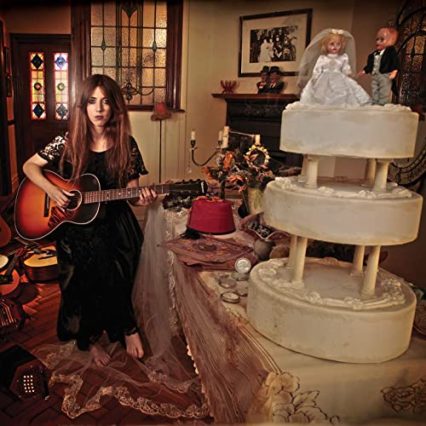Strange Lights Over Garth Mountain: critic Gareth Smith reviews Gwenifer Raymond’s second album, a Welsh twist on American Primitive.

The distinct sense of uncanniness pervading Gwenifer Raymond’s new album emerges mostly, but not entirely, from its eight unsettling tracks. The title, Strange Lights Over Garth Mountain, immediately invokes an incongruity between the familiar and the unusual, every day and the otherworldly, which sets the scene for what is to follow. The album cover is similarly disquieting, featuring a po-faced Raymond posing near a wedding cake which is topped by the hideous bride and groom dolls. This sense of warped conventionality and self-conscious eeriness reflects the tone and structure of the album itself, creating expectations that the songs then fulfil. The result, beginning with the suitably entrancing ‘Incantation’, is too eclectic and unusual for simple designation as a ‘folk album’.
While there are obvious continuities with Raymond’s You Were Never Much of a Dancer (2018), Strange Lights Over Garth Mountain is more compact, more musically experimental and, by Raymond’s own admission, less immediately indebted to the folk and blues tradition. In her first album, Raymond presented a ‘Requiem for John Fahey’, widely acknowledged as the Godfather of the American Primitive style and a key influence on her work. In Strange Lights, there is instead a ‘Eulogy for a Dead French Composer’, suggesting a more complex, and humorous, engagement with her musical antecedents. As Raymond notes on her website, ‘all of those dead men are hard to shake’.
Despite these abiding influences, Strange Lights develops ‘American Primitive’, characterised by folksy melodies and fast fingerpicking techniques, into a style that thematically expresses her Welsh roots. Raymond herself has suggested that Wales played a greater role in the construction of this album than her previous works, particularly the evocative childhood images which inspired its title. Her description of the album as ‘Welsh primitive’ is reflected in melodies that suggest small communities, vast landscapes and a sense of nostalgia that can be both soothing and sinister. Creepy might not be the most sophisticated word to describe its overall tone, but it is certainly one of the most accurate. Raymond’s lingering, taut tunes evoke continual tension and menace, while many of the titles (‘Hell for Certain’, ‘Gwaed am Gwaed’) suggest a persistent engagement with the supernatural and the occult.
There is no particular narrative or trajectory to the album; the slower and more meditative songs are mixed with the frantic and fast-paced in a manner that promises regular surprises and changes in tone. Highlights include ‘Gwaed am Gwaed’, a poignant number that truly highlights the intricate skill of Raymond’s technique, and ‘Ruben’s Song’, standing out as an optimistic offering among the macabre alternatives. The album ends with the titular track, providing a fittingly haunting conclusion. Strange Lights Over Garth Mountain ultimately proves to be something both familiar and novel – a clear contribution to the ‘folk horror’ subgenre but which infuses its ethereal acoustics with a decidedly Welsh sensibility.
Strange Lights Over Garth Mountain by Gwenifer Raymond is available now.
Gareth Smith is an avid contributor at Wales Arts Review.
(Header image credit: Jinwoo)
_______________________________________________________________________
Recommended for you:











